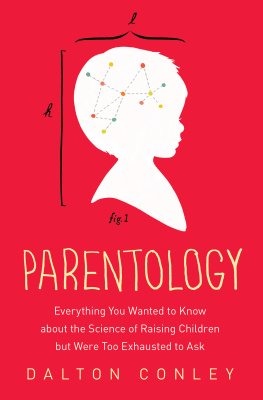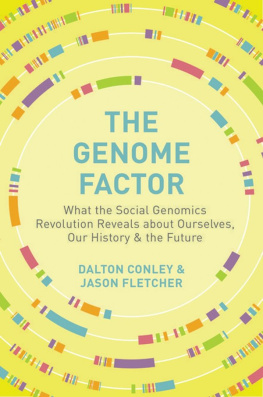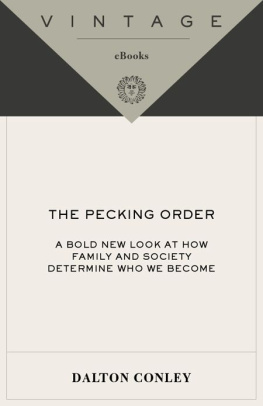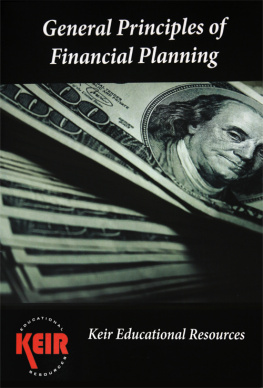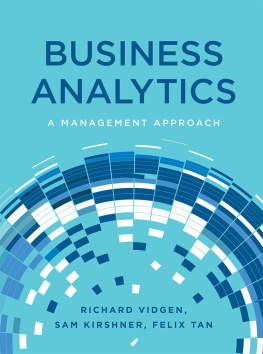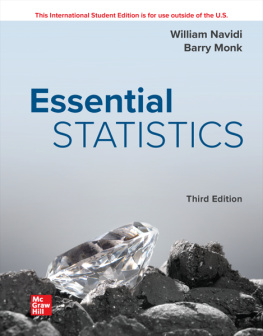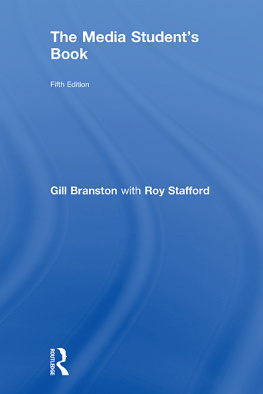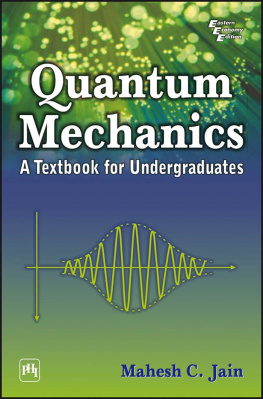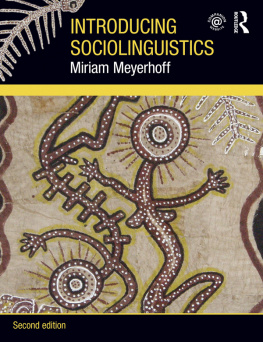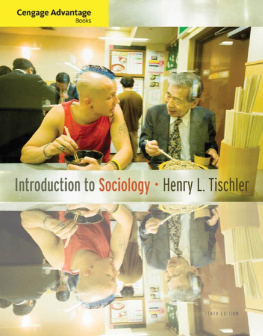Dalton Conley - June 1,
Here you can read online Dalton Conley - June 1, full text of the book (entire story) in english for free. Download pdf and epub, get meaning, cover and reviews about this ebook. year: June 1, 2017, publisher: W. W. Norton & Company, genre: Science. Description of the work, (preface) as well as reviews are available. Best literature library LitArk.com created for fans of good reading and offers a wide selection of genres:
Romance novel
Science fiction
Adventure
Detective
Science
History
Home and family
Prose
Art
Politics
Computer
Non-fiction
Religion
Business
Children
Humor
Choose a favorite category and find really read worthwhile books. Enjoy immersion in the world of imagination, feel the emotions of the characters or learn something new for yourself, make an fascinating discovery.

- Book:June 1,
- Author:
- Publisher:W. W. Norton & Company
- Genre:
- Year:June 1, 2017
- Rating:4 / 5
- Favourites:Add to favourites
- Your mark:
- 80
- 1
- 2
- 3
- 4
- 5
June 1,: summary, description and annotation
We offer to read an annotation, description, summary or preface (depends on what the author of the book "June 1," wrote himself). If you haven't found the necessary information about the book — write in the comments, we will try to find it.
June 1, — read online for free the complete book (whole text) full work
Below is the text of the book, divided by pages. System saving the place of the last page read, allows you to conveniently read the book "June 1," online for free, without having to search again every time where you left off. Put a bookmark, and you can go to the page where you finished reading at any time.
Font size:
Interval:
Bookmark:
You May Ask Yourself originated in the Introduction to Sociology course that I have taught on and off since the mid-1990s at New York University, Yale University, and Columbia University. However, the process of writing it made me feel as if I were learning to be a sociologist all over again. For example, I never taught religion, methodology, or the sociology of education. But instructors who reviewed the manuscript requested that these topics be covered, so with the assistance of an army of graduate students who really ought to be recognized as coauthors, I got to work. The experience was invaluable, and in a way, I finally feel like a card-carrying sociologist, having acquired at last a birds-eye view of my colleagues work. I consider it a great honor to be able to put my little spin (or filter) on the field in this way, to be able not just to influence the few hundred intro students I teach each year, but to excite (I hope) and instill the enthusiasm I didnt get to experience until graduate school in students who may be just a few months out of high school (if that).
I mentioned that the graduate students who helped me create this book were really more like coauthors, ghost writers, or perhaps law clerks. Law clerks do much of the writing of legal opinions for judges, but only a judges name graces a decision. I asked Norton to allow more coauthors, but they declinedperhaps understandably, given how long such a list would beso I will take this opportunity to thank my students and hope that you are still reading this preface.
The original transcription of my lectures that formed the basis of this text was completed by Carse Ramos, who also worked on assembling the glossary and drafted some parts of various chapters, such as sections in the economic sociology chapter, as well as some text in the chapters on authority and deviance. She also served as an all-around editor. Ashley Mears did the heavy lifting on the race, gender, family, and religion chapters. Amy LeClair took the lead on methods, culture, groups and networks, socialization, and health. Jennifer Heerwig cobbled together the chapter on authority and the state and deviance (a nice combo), while her officemate Brian McCabe whipped up the chapter on science, technology, and the environment and the one on social movements. Melissa Velez wrote the first draft of the education chapter (and a fine one at that). Michael McCarthy did the same for the stratification chapter. Devyani Prabhat helped revise the social movements chapter. My administrative assistant, Amelia Branigan, served as fact-checker, editor, and box drafter while running a department, taking the GREs, and writing and submitting her own graduate applications. When Amelia had to decamp for Northwestern University to pursue her own doctorate, Lauren Marten took over the job of chasing down obscure references, fact-checking, and proofreading. Alexandre Frenette drafted the questions and activities in the practice sections at the end of each chapter.
For the Second Edition, much of the work to integrate the interview transcripts and update material based on reviewer feedback fell to a great extent on the shoulders of Laura Norn, a fantastic New York University graduate student who has worked on topics as far ranging as public toilets (with my colleague Harvey Molotch) to how symphonies and designers collaborate (as part of her dissertation). I hope Laura will find her crash-course overview of sociology useful at some point in what promises to be a productive and exciting scholarly career.
When it was time to begin the Third Edition, the updating of all the statistics, fact-checking, and so on that is the bread and butter of a revision fell upon the capable shoulders of Emi Nakazato, who though trained as a social worker in graduate school, adeptly pivoted to that fields cousin, sociology.
For the Fourth and Fifth Editions, Laura Norn returned as the research assistant. With her prior experience she picked up the task ably without dropping a beat.
In addition to the students who have worked with me on the book, I need to give shouts out to all the top-notch scholars who found time in their busy schedules to sit down with me and do on-camera interviews: Julia Adams, Andy Bichlbaum, danah boyd, Andrew Cherlin, Nitsan Chorev, Susan Crawford, Adam Davidson, Matthew Desmond, Stephen Duncombe, Mitchell Duneier, Paula England, John Evans, Michael Gaddis, David Grusky, Fadi Haddad, Michael Hout, Jennifer Jacquet, Shamus Khan, Annette Lareau, Jennifer Lee, Ka Liu, Douglas McAdam, Amos Mac, Ashley Mears, Steven Morgan, Alondra Nelson, Devah Pager, Nathan Palmer, C. J. Pascoe, Frances Fox Piven, Allison Pugh, Adeel Qalbani, Marc Ramirez, Asha Rangappa, Jennan Read, Victor Rios, Jeffrey Sachs, Jennifer Senior, Mario Luis Small, Zephyr Teachout, Duncan Watts, and Robb Willer.
The filmmaking, editing, and postproduction were done by Erica Rothman at Nightlight Productions with the assistance of Jim Haverkamp, Kevin Wells, Saul Rouda, Dimitriy Khavin, and Arkadiy Ugorskiy. This was no easy task, because we wanted a bunch of cuts ranging from 30-second sound bites to television-show-length segments of 22 minutes. Although a bunch of interviews with academic social scientists on topics ranging from estimating the effects of Catholic schools on student outcomes to the political economy of global trade to the social contagion of autism are not likely to win any Emmys or rock the Nielsens (with the possible exception of the one on college sex), it was certainly one of the most exciting highlights in my sociological career to host this makeshift talk show on such a wide range of interesting topics. (If only more of our public discourse would dig into issues in the way that we did in these interviews, our society and governance would be in better shapeif I do say so myself!)
I also relied on a number of scholars who generously read chapters of this book and offered valuable feedback, criticisms, and suggestions:
- Faye Allard, Community College of Philadelphia
- Donna Bird, St. Josephs College of Maine
- Craig M. Cerny, St. Philips College
- Paul S. Dean, Ohio Wesleyan University
- Jack Delehanty, University of Minnesota
- Laurel Duchowny, Ohlone College
- David Everson, University of Notre Dame
- Irene Fiala, Edinboro University of Pennsylvania
- Juan Arroyo Flores, University of South Florida
- Laurie Forbes, Lakehead University
- Kimberly E. Fox, Bridgewater State University
- Colleen Freeman, Grace University, Omaha, Nebraska
- Stephanie Patrice Hall, Georgia State University
- Melanie D Hildebrandt, Indiana University of Pennsylvania
- Amy Holzgang, Cerritos College
- Ariana Kalinic, Monterey Peninsula College
- Jean Karutis, Fulton Montgomery Community College
- Kim Cochran Kiesewetter, Sandhills Community College
- Kyle Knight, University of Alabama in Huntsville
- Annette Lareau, University of Pennsylvania
- Lisa Lepard, Kennesaw State University
- Jason Leiker, Utah State University
- Ophra Leyser-Whalen, University of Texas at El Paso
- Stephen Lippmann, Miami Universityvcv
- Anna-Maria Marshall, University of Illinois at Urbana-Champaign
- Rodney McDanel, Ivy Tech Community College of Indiana
- Juliana McGene, University of Southern California
- Kyle Nelson, University of Northern Colorado
- Brian L. Rich, Transylvania University
- Elizabeth Scheel-Keita, St. Cloud State University
- Laura Scott, Los Angeles Valley College
- Britta Solan, Des Moines Area Community College, Urban/Des Moines Campus
- Deirdre Sommerlad-Rogers, Greensboro College
- Lorene Stone, Missouri State University
- Kate Turcotte, Colby-Sawyer College
Font size:
Interval:
Bookmark:
Similar books «June 1,»
Look at similar books to June 1,. We have selected literature similar in name and meaning in the hope of providing readers with more options to find new, interesting, not yet read works.
Discussion, reviews of the book June 1, and just readers' own opinions. Leave your comments, write what you think about the work, its meaning or the main characters. Specify what exactly you liked and what you didn't like, and why you think so.

